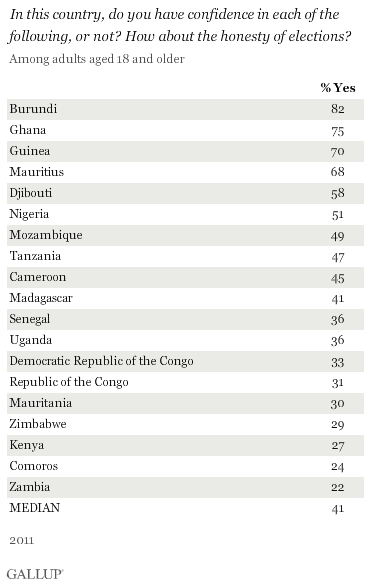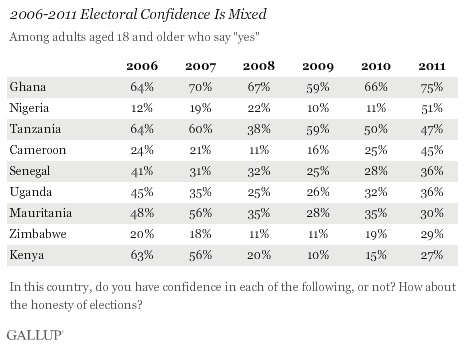WASHINGTON, D.C. -- Despite their governments' efforts to hold credible elections over the past decade, residents in many sub-Saharan African countries are still skeptical about their electoral process. Across 19 countries Gallup surveyed in 2011 -- representing about 60% of individuals old enough to vote -- a median of 41% say they have confidence in the honesty of elections in their countries. Majorities in six countries express confidence.

Gallup's research shows Africans tend to trust elections least among national institutions. But to put these findings in perspective with those elsewhere around the world, 20% in Russia, 47% in the U.S., and 63% in Vietnam, among those aged 18 and older, have confidence in the honesty of elections in their countries. The results provide important metrics about the current confidence levels in several countries, such as the Democratic Republic of the Congo, Mauritania, and Senegal, that have elections scheduled over the next several months. Trended results, perhaps, provide the most valuable information for national governments, civil society, and international observers to assess changes in residents' perceptions of elections in their countries.
Confidence Rising in Several Countries
Trust in elections -- or lack of it -- varies greatly across countries for which Gallup has data for six consecutive years. Ghana stands out as the front-runner, with majorities expressing confidence in their elections year after year, albeit with some fluctuations. It is important to note Ghanaians' relatively high level of confidence in the honesty of elections also extends to other national institutions.

Tanzania is the runner up, with majorities or pluralities expressing confidence in the honesty of elections in most years between 2006 and 2010. Nevertheless, the overall trend shows Tanzanians' confidence in their electoral system has declined after regaining some ground in 2009.
In all other countries, relatively few residents express confidence in the honesty of elections. The overall trend shows increasing confidence in elections in Cameroon, Nigeria, and Zimbabwe, while in Mauritania it declined. However, results from several countries, most notably Nigeria, reveal large increases in confidence since last year. Nigerians cast their ballots in presidential and parliamentary elections in April 2011, four months before Gallup conducted the survey. Despite the violence that erupted in some northern states in Nigeria, international observers deemed the elections an improvement from past ones.
There is also the special case of Kenya, where majorities expressed confidence in their electoral system in 2006 and 2007, but then trust plummeted the following year. While it started to improve in 2010, confidence is still half the 2007 level, when violence erupted after the presidential election results released later that year. In 2011, 27% of Kenyans, aged 18 and older, say they have confidence in the honesty of elections. But it remains to be seen whether this positive trend will be sustained in anticipation of the next round of national elections in late 2012.
Implications
Although several sub-Saharan African countries, including Ghana and more recently Kenya, have implemented reforms to make elections more competitive, transparent, and credible, many residents still lack confidence in the process.
Perceptions about the honesty of elections do matter and can influence voters' behavior. As such, governments and civil society should engage citizens through voter and civic education to anchor progress in terms of electoral reforms. In addition to addressing logistical issues such as voters' access to polling stations, it is important for citizens to be able to cast their ballots in a safe environment. Future research will analyze socio-demographic factors relating to electoral confidence in sub-Saharan Africa, with a focus on young people.
For complete data sets or custom research from the more than 150 countries Gallup continually surveys, please contact SocialandEconomicAnalysis@gallup.com or call 202.715.3030.
Survey Methods
Results are based on face-to-face interviews with at least 600 adults, aged 18 and older, conducted 2006-2011 in Burundi, Cameroon, Comoros, Democratic Republic of the Congo, Djibouti, Ghana, Guinea, Kenya, Madagascar, Mauritania, Mauritius, Mozambique, Nigeria, Republic of the Congo, Senegal, Tanzania, Uganda, Zambia, and Zimbabwe. For results based on the sample of national adults, one can say with 95% confidence that the maximum margin of sampling error ranges from ±3.3 percentage points to ±4.3 percentage points. The margin of error reflects the influence of data weighting. In addition to sampling error, question wording and practical difficulties in conducting surveys can introduce error or bias into the findings of public opinion polls.
For more complete methodology and specific survey dates, please review Gallup's Country Data Set details.
